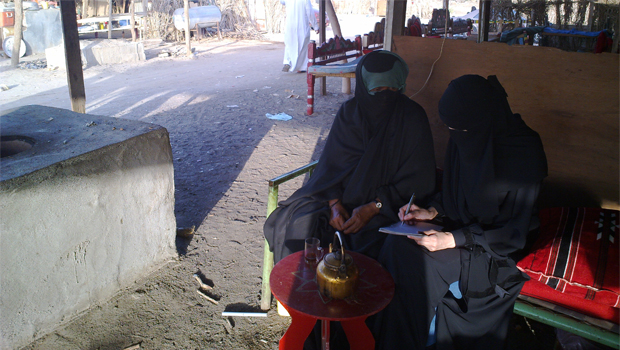Kaidi is a ma’aziba, which translates as “forewoman” in the regional dialect. She is one of nine local women who operate roadside rest stops that act as modern-day caravanserai — places where travelers can rest, eat, sleep and do laundry, before moving on.
The different businesses are clustered together at a popular rest stop on the coastal highway.
Kaidi’s café/restaurant is as humble as the caught-that-day fish and freshly baked bread is delicious. The structures are a jumble of wooden planks and dried palm fronds with the occasional bundle of wires and exposed lighting—but don’t let the looks deceive.
“We in this market serve a vast number of people who pass along this highway that links the southern areas of the Kingdom to the western region,” she said as her employees — all of them immigrant women — serve the lunch crowd at the restaurant about 200 kilometers from Abha city.
Today these establishments are offering fewer services than in the past, and they may be in danger of disappearing altogether, replaced by modern-day alternatives.
On a good (but very long) day, Kaidi grosses SR3,000 to pay for workers, supplies, transportation, and hopefully some profit.
These establishments are not new — many of these women have inherited these businesses from their mothers and grandmothers, up to three generations of rural female entrepreneurs serving men and women.
Like the other women, Kaidi, whose formal education ended at second grade, has run her establishment for over 10 years.
Kaidi wears hijab but does not cover her face. She has two cell phones — one for her private contacts and the other for her customers to call in orders.
Despite her illiteracy (she admits she can barely read or write), Kaidi says she is doing OK. Her husband is retired and she has a son who recently graduated from a health sciences college. She says she’s not working “because of bad social conditions.”
“I am doing it because this is how we women work in the south,” she said. “We work harder than those so-called businesswomen!”
Kaidi’s day begin at dawn and she works until 11 p.m. She prepares dishes, including mixed vegetables in the local hanith style with its regional spices.
These establishments include shaded areas filled with traditional high benches where families can sit together for their meals.
Wearing a translucent headscarf showing clearly her auburn hair, Fatima Abu Bakr, another local businesswoman, seemed too busy to speak to Arab News.
“Leave me alone, I need to work and make money,” she said, before heading over to a male customer, imploring him to be kind to his wife by buying her a fish.
Eventually, Fatima warmed up to this reporter, saying she was not sure how old she is because “I was born before the identification card. What I do know is that I have been doing this job for 60 years.”
When asked about any issues she’s had as a small business owner, she complained about her inability to get help in buying a new washing machine and refrigerator.
“It seems like everything here works through wasta,” she said, referring to the Arabic term for the custom of helping people only if they have personal contacts and special access to officials. Fatima has only managed to borrow money to develop her business, and now she’s in debt.
Mohammad Zaid Al-Almai, a Saudi columnist from Asir who has written about these women-run establishments, said that the very modernity that professes to help women be self-reliant could end up destroying these traditional micro-businesses and markets in rural southwestern Saudi Arabia.
“The traditions of village people die out after they move to the city,” he said, adding that the best thing charity organizations can do is help these women stay where they are doing what they do in local markets where they have established reputations.










